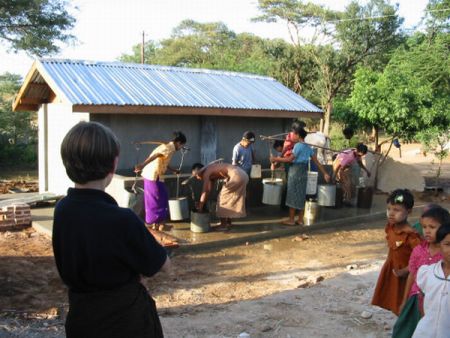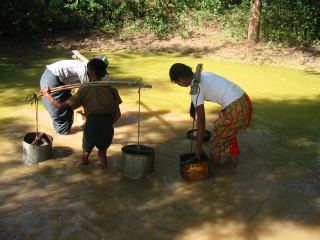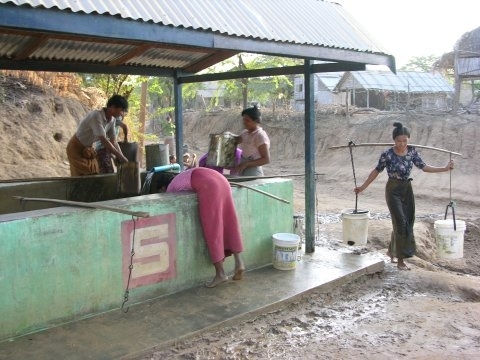![]()
Thu-Htay-Kan Village - Burma
Village Survey Results
 On
one visit to the Thu-Htay-Kan village Professor Scott Pearson was impressed
with the improvements in the standard of living that has resulted from
the installation of the well in the village. He suggested a simple survey
be taken among the villagers.
On
one visit to the Thu-Htay-Kan village Professor Scott Pearson was impressed
with the improvements in the standard of living that has resulted from
the installation of the well in the village. He suggested a simple survey
be taken among the villagers.
It has taken a long time to complete the survey and get it transulaed from Burmese to English. Here is that report received in March 2008.
Questionnaire to Assess the Impact of the New Well in Thu-Htay-Kan Village
1. What do you feel are the greatest advantages - to your family and to your village - of having the new well to supply water regularly?
Ans: Most notable advantage to our families & to the village are:
-
(a) Better health because water is potable and hygienic.
(b) Saves much time & work compared to drawing water from wells 2/3
miles afar.
(c) Much economical benefit as we pay less for the water and we can have
more water for home use and feeding cattle.
 2.
Before the new well began operating (in 2003), how much time each day
did members of your family spend to bring water to your home and farm?
Since the new well began operating (in 2003), how much time each day do
members of your family now spend to bring water to your home and farm?
2.
Before the new well began operating (in 2003), how much time each day
did members of your family spend to bring water to your home and farm?
Since the new well began operating (in 2003), how much time each day do
members of your family now spend to bring water to your home and farm?
Ans: Before 2003, each day average household spend 2 to 3 hours bringing water from nearby wells. Now less than one hour to bring water.
3. How do your family members spend the time that they have saved in bringing water to your home and farm? Leisure? Childcare? Additional farm labor? School? Community meetings? Literacy classes? Public health classes? Other?
Ans: More on leisure & child care and additional farm labor. School, community meetings, literacy classes or public health classes and matters concerning the village collectively is taken care of by administrative officials from these different fields.
4. Has the availability of regular water supplies from the new well changed the ways in which you produce food for your family's own consumption? If so, what are you doing differently? (Please compare your family's pattern before the new well with the current pattern since the well began operating.)
Ans: When there is regular supply of water (when electricity is available) household members can spend more time in the fields. Improvements and saving of time and better cleaning of utensils with regard to cooking and producing food for household is commonly cited.
5. Is your family (and other village families) eating more food (receiving more food energy, i.e., calories) or a better diet (more vegetables, fruits, and milk) since the new well began operating? If so, can you describe the changes and estimate how great the improvement has been? (Please compare your family's pattern before the new well with the current pattern since the well began operating.)
Ans: Life in general and food intake has improved since the new well
began operating. but the villagers seem not to understand or be able to
gauge the changes in pattern in their way of life. They seem to say there
has been a definite improvement but they tend to emphasize more on convenience,
less labor, more economical, time saving to a great extend and the like.
They did not say or understand if there has been an appreciable difference
in the pattern of daily life before & after operation of the well.
6. Is your family (and other village families) producing more vegetables
for sale since the new well began operating? If so, can you describe the
changes and estimate how great the improvement has been? (Please compare
your family's pattern before the new well with the current pattern since
the well began operating.)
Ans: They say households definitely produce more vegetables & crops since the new well began operating. But improvement is basically in the household and in the village in general as water from the well is used exclusively for the household & village. The farms are some distance and water is taken from different sources.
7. Is your family (and other village families) producing more goat meat or milk for sale since the new well began operating? If so, can you describe the changes and estimate how great the improvement has been? (Please compare your family's pattern before the new well with the current pattern since the well began operating.)
Ans: More households say that livestock and milk production increase greatly as a direct result of the availability of water from the tube well. When asked for figures, they indicated something like 10 to 20 percent increase in goat meat & milk production. With price rise in all commodities across the country, households which raise goat and cattle are doing much better.
 8.
Would you and your family be willing to contribute to the costs of maintaining
the new well and to operating the diesel pump? If so, how much do you
feel each family in your village should pay each year to run the pump
and maintain the well?
8.
Would you and your family be willing to contribute to the costs of maintaining
the new well and to operating the diesel pump? If so, how much do you
feel each family in your village should pay each year to run the pump
and maintain the well?
Ans: All households express willingness to make contribution to the costs of the maintaining the new well and the diesel pump. They agreed to having a committee of the village elders and administration officials take care of all matters relating to the tube well. Now everytime anyone draws water, he/ she has to pay Ks 10 for drawing water with 2 big buckets each time and Ks 40 with barrel on bullock cart. Each day tube well operates about one hour in the morning and about 2 hours in the afternoon during which time people draw water. Of course no operation during electric outage - which happens on and off.
9. How should operating and maintenance costs for the well be collected and distributed? Should there be a separate agency set up to run the well, or should this decision be a function of the regular village government?
Ans: I have reported earlier that the village committee has agreed to deposit such earnings in the bank for maintenance and other costs relating to the functioning of the tube well. You might remember I have paid for the cost of repairing the submersible pump which has to be brought to Yangon. They agreed beforehand to reimburse the cost which amounted to Ks. 300,000. They have yet to pay it back. (Pl read 9 & 10 in conjunction.)
10. If more money could be made available from outside friends or from government, what do you feel are the highest priorities for additional investment projects that would assist your village and region?
Ans: Different answers to the question. If more money be made available
from outside sources. Some say priority should be given to improve health
projects, others say it should be used for education projects. They do
not seem to have a clear understanding or conception of "additional
investment projects" that would assist the village & the region.
If such funds become available perhaps a thorough discussion and consultation
with the village elders and the gov administration officials will be necessary
to determine how it could be used to good purpose.
Comment from Ground Operator:
FYI : more than a year ago, there was a change in the system, apparatus
and personnel of all township, district, village and ward councils all
over the country. The former council officials were replaced with younger
persons who must be a graduate. 3 members. One appointed by gov with salary.
Chairman and senior Member and another member appointed by gov with salary.
Formerly no salary was given, on the assumption that council members do
the work on a voluntary basis. Now the appointed younger council members
are provided with salary Ks 30,000 - 50, 000. But aside for the gov appointed
member the Chairman and Senior Member have not yet received any salary
from the gov. They are expected to be free of corruption and much more
efficient.
The same changes has taken place with the ThuHtayKan village administrative
Council.
We have to deal with this council as well as with the village elders.
Generally our efforts are appreciated by all as the practical benefits
accrue to the whole village.
Return to Thu-Htay-Kan village Report
See additional photos taken in 2002 when travelers visited and a more recent visit in 2004.
Latest pictures from the third well project and the new school building - June 2004.
Generosity
in Action- travelers
helping in developing countries
Home Page / Projects
/ Tour Operator Guidelines / Tax
Deductibility / About Generosity in Action
/ email GiA